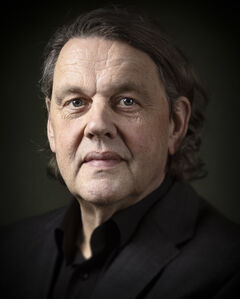
‘Universities must be quicker to show true social colors’
The TU/e board recently issued a public statement on the war between Israel and Hamas, saying it didn’t want to take a political stance in the matter. According to communications expert Frank Peters, it’s actually important to identify social issues at an early stage and take a stance if those around you expect you to. “Companies and institutions need to realize they’re not only there to do their own thing.”
For decades now, the conflict between Israel and Palestine has been on people’s minds. When the attack by Hamas took place in October, on the back of which Israel started a war in Gaza, the conflict escalated yet again. This has led to protests and demonstrations all around the world, including in the Netherlands.
In recent months, these protests also reached TU/e. Pro-Palestine protesters demand that the university show solidarity with Palestine, among other things. However, in an online statement the Executive Board says this isn’t possible because the university “is not a political institution” and it could lead to polarization of the TU/e community.
Growing social expectations
“More and more frequently and more and more emphatically, organizations are expected to express their opinions on social situations,” says communications expert Frank Peters in an interview. He believes this didn’t use to be the case, at least not to this extent.
Having said that, he’s positive about this change. “Companies and institutions need to realize they’re not only there to do their own thing and – in this case – to educate students. As a university, you’re part of society and you have to adopt a critical perspective. Also when it comes to how you relate to social issues, and how your other stakeholders relate to these issues.” Peters, who authored several books on communications, emphasizes that an organization should therefore not only keep in mind its shareholders, but all off its stakeholders. “So also your employees and – in this case – your students.”
If you have values, you’ll have to act in accordance with them
Comparing core values
According to Peters, the current generation of students is more sensitive to social topics. “This group looks at whether their personal values align with the values the organization represents and promotes.” This way, they look for confirmation in the behavior of the university they study at, says Peters.
He stresses how important it is for organizations to abide by their own core values. “Values are there for a reason. They shape the behavior of the organization. If you have values, you’ll have to act in accordance with them. That’s all your reputation is, doing what you promise.”
Core values of TU/e
TU/e’s current core values are ‘open’, ‘personal’, ‘engaged’, and ‘curious’. They are currently being revised under the guidance of Rector Magnificus Silvia Lenaerts and Integrity Ambassador Ingrid Heynderickx. This is a bottom-up process, in close collaboration with the TU/e community. At the start of the 2024/2025 academic year, the revised core values will be announced. Based on interim updates, the expectation is that the new core values will not be fundamentally different from the current four.
It’s always better to make your own decision to take a stance than to be forced to do so
Social antenna required
It’s exactly because the current generation of students has such social engagement that Peters believes it’s extra important for a board to have a social antenna and sufficient situational awareness. “This allows them to identify social issues at an early stage and – preferably – take a stance in the matter before they’re forced to do so.”
He also calls this phenomenon – beating critics to it – ‘stealing thunder’. “You do so by very quickly issuing a statement yourself,” he says. “It’s always better to make your own decision to take a stance than to be forced to do so. It takes the pressure off.” As an example, he mentions the University of Amsterdam (UvA). They issued a public statement right away on October 26, 2023. “At first, UvA was ahead of all the pressure,” he emphasizes. “However, after that you will have to see what’s required to meet the expectations, otherwise things can still escalate. And the upper echelon of the organization will also have to be visible when it comes to those social themes.”
TU/e also drafted a response to the situation in Israel and Palestine early on, on October 31, 2023. However, this wasn’t published publicly but internally sent round by email, with the somewhat general subject heading ‘In our TU/e community, we respect each other, even when opinions differ’. The question is how many people at TU/e actually read this email.
As it concerns complex, sensitive subject matter, the policy must be drafted with care and due consideration
No clear policy (yet)
After the email on October 31, Studium Generale, ESA and TINT organized dialogue sessions on the war halfway through November (watch the dialogue online). This was followed by radio silence for a few months, until – following an open letter and several protests – a public statement of the Executive Board appeared online. In that statement, the Board declared TU/e is not a political institute, to the dissatisfaction of pro-Palestine protesters. The Executive Board has not made any subsequent statements in the matter and no new initiatives (such as dialogue sessions) have been organized on behalf of the university.
According to spokesperson of the board Ivo Jongsma, it concerns a “relevant and current topic”, but one that’s difficult to make specific comments about as yet. This is because, according to him, there’s no policy for situations like these in place yet. “This policy, relating to far-reaching and worldwide developments and crises, is in the works. It will be elaborated over the summer and autumn and then it will be implemented. As it concerns complex, sensitive subject matter, the policy must be drafted with care and due consideration, also making sure it dovetails with guidelines issued by umbrella organization Universities of the Netherlands,” says Jongsma.
By choosing a side between Russia and Ukraine, the university has shot itself in the foot
So what about the Ukrainian flag?
These statements about ‘not having policy’ and ‘not being a political institution’ raise questions with part of the TU/e community. Professor of Analytics Boudewijn van Dongen writes the following in a column: “It wasn't very tactical to insist to the anti-Israel demonstrators that the TU/e is not a political organization, while the Ukrainian flag is waving proudly outside.” In another opinion piece, student M. Van Dijk writes: “By choosing a side between Russia and Ukraine, the university has shot itself in the foot. After all, the valuable neutrality has been broken but should not be taken as an example for the future conduct of similar situations.”
Cursor spoke about the situation with spokesperson of the board Ivo Jongsma.
How does flying the Ukrainian flag relate to the statement about ‘political neutrality’?
“In 2022, the Minister of Education, Culture and Science called to freeze ties with Russia. This was a political message that came from above and that all universities in the Netherland heeded. In our new policy, we will include basic principles that will also cover the possible flying of flags.”
Was the raising the Ukrainian flag also ordered, or was this on TU/e's own initiative?
"This was on TU/e's initiative. You have to see it in context: the government made it very clear that it stood by Ukraine and was shocked about Russia's invasion."
What are the reasons for keeping the Ukrainian flag up there, at a time of discussion about political neutrality?
"We want to fully work out our new principles for dealing with these kind of situations before we implement anything."
Last month, protesters put up the Palestinian flag on campus. This flag was quickly removed. Why was this flag removed?
“The flag was put up illegally, damaging the mechanism of the flagpole into the bargain. This was repaired when the flag was removed.”
In the aforementioned opinion piece, an employee suggested never to fly other country flags than that of the Netherlands, and instead putting up the Dutch flag for human rights. What does the university think of this idea?
“These are great suggestions, which we’re taking on board in our new policy.”
Update (Tuesday, July 9): an earlier version of this article stated that it was unclear whether the raising of the Ukrainian flag was ordered by the government or on TU/e's own initiative. Meanwhile, spokesman Ivo Jongsma has confirmed that it was on TU/e's own initiative. The answer to this question, and to an additional follow-up question as to why the flag is still there has been added in this version.
The attack on Ukraine basically also was an attack on the West
What’s the difference for administrators?
According to Peters, it was to be expected that TU/e – along with many other institutes for higher learning – would quickly side with Ukraine after Russia’s invasion of the latter in 2021. “In the case of Russia-Ukraine, I think we feel it’s an attack on our community. The attack on Ukraine basically also was an attack on the West. And I think that makes it easier to quickly fly that flag and develop all kinds of initiatives,” he explains. “In one case there’s almost an immediate threat to western civilization and in the other it’s far away, not an immediate threat, and that means people don’t feel the need to express their opinions quite as much.” In addition, he thinks the divided views on the conflict also play an important role. “You won’t be able to meet everyone’s expectations and that’s why administrators are having a hard time taking a stance in this conflict.”
In spite of this, Peters feels its important for the board to stay in the conversation. “As long as this is on the minds of the people within your organization, you’ll have to keep assuming a role in the matter. If you don’t, the pressure will increase, and escalate like it did in the US.”
With this interest in mind, Cursor asked Jongsma if TU/e has any initiatives in the pipeline to encourage dialogue. “We mainly give parties space to let themselves be heard and organize events. We are keeping a close eye on sentiments within the organization, and continue to talk to people to gauge their needs. In so doing, organizing dialogue sessions is definitely an option we wish to facilitate.” In other words, TU/e will allow organizing dialogue sessions and the like, but isn’t planning any initiatives of its own for now.


Discussion